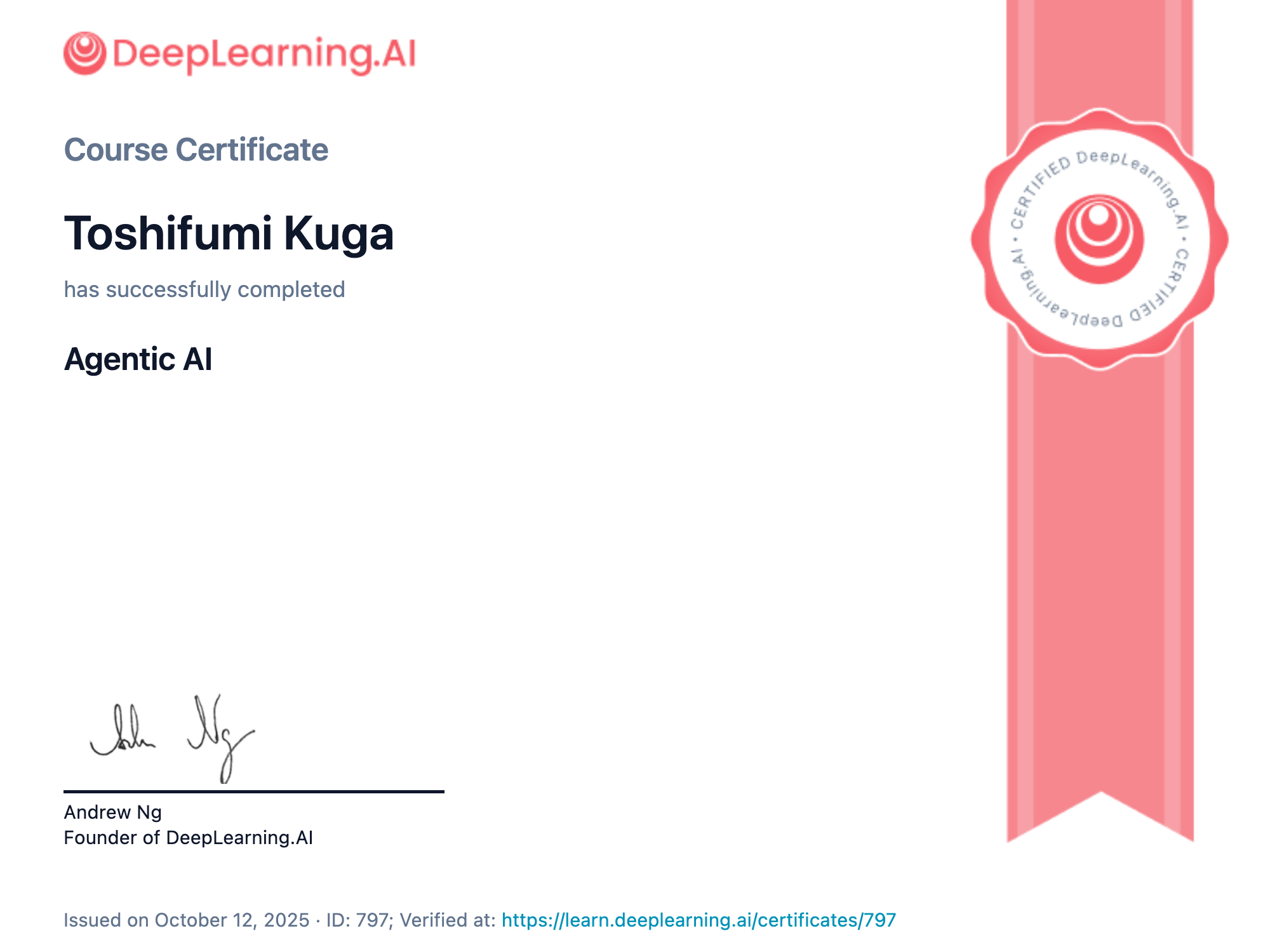A new online course called "Agentic AI" (1) has been released by DeepLearning AI. The creator is Andrew Ng, an adjunct professor at Stanford University, who is also famous for his past machine learning-related courses. For me, this is the first course I've taken from him since the Deep Learning Specialization in 2018. I've just completed it, and I'd like to share my thoughts and a recommendation.
1. Course Overview
The course is divided into five modules, each consisting of 5-7 short videos (about 5-10 minutes each), a quiz, and coding tasks using jupyter notebook. By passing each assignment, you are ultimately awarded a certificate of completion. The level is listed as intermediate; while a basic knowledge of Python is necessary, I believe that even those without specialized knowledge in AI can progress through the material and naturally come to understand it. The main topics are as follows:
Reflection: AI critiques its own work and iterates to improve quality—like code review, but automated.
Tool Use: Connect AI to databases, APIs, and external services so it can actually perform actions, not just generate text.
Planning: Break complex tasks into executable steps that AI can follow and adapt when things don’t go as expected.
Multi-Agent: Coordinate multiple specialized AI systems to handle different parts of a complex workflow.
Created by Andrew Ng, who teaches at Stanford while concurrently doing practical consulting work, I found the course to have a wonderful balance between theory and practice.
2. Reflection and Tool Use
The second and third modules are critical technologies for the future realization of AGI. In particular, "Reflection," where an AI improves itself, is also known as Recursive Self Improvement and is a field being researched worldwide. This module introduces a method that allows even non-experts to incorporate reflection functionality, which I am very eager to try implementing. Additionally, using tools allows a generative AI to incorporate information that is difficult to acquire on its own, thereby enhancing the AI agent's capabilities. Furthermore, this information can be applied to the "Reflection" process, promising a synergistic effect. I'm also keen to implement this and see what kind of information can be integrated.
3. Error Analysis
As Andrew Ng states, this fourth module is, in my opinion, the most important and valuable content in the course. Generative AI is excellent, but it is not perfect. There is still a considerable possibility that it will produce incorrect answers. Therefore, to raise its accuracy to a practical level, the course emphasizes the importance of adopting a strategy that quickly identifies the parts of the overall process with the lowest performance and allocates resources to improving those areas. I can certainly see how for a complex AI agent that may contain numerous sub-agents, identifying and prioritizing the reinforcement of its weaknesses is incredibly important in practical applications.
So, what did you think? With a flood of AI-related news every day, many people are likely wondering, "How should I proceed with my AI projects from now on?" I believe this course provides a valuable perspective for thinking in the medium to long term. While it is a paid course, it is not as expensive as university tuition, and I highly recommend trying it. Incidentally, because I studied intensively, I was able to receive my certificate in about three days. It's certainly possible for a business professional to complete it over a long weekend.
Well, that's all for today. Stay tuned!
You can enjoy our video news ToshiStats-AI from this link, too!
1) Agentic AI, Andrew Ng, DeepLearning AI, Oct 2025
Copyright © 2025 Toshifumi Kuga. All right reserved
Notice: ToshiStats Co., Ltd. and I do not accept any responsibility or liability for loss or damage occasioned to any person or property through using materials, instructions, methods, algorithms or ideas contained herein, or acting or refraining from acting as a result of such use. ToshiStats Co., Ltd. and I expressly disclaim all implied warranties, including merchantability or fitness for any particular purpose. There will be no duty on ToshiStats Co., Ltd. and me to correct any errors or defects in the codes and the software.

